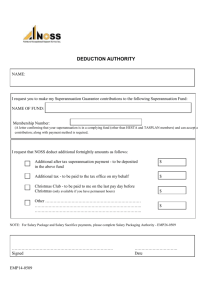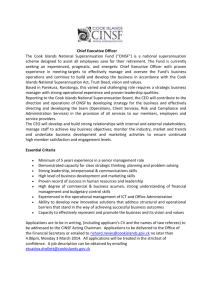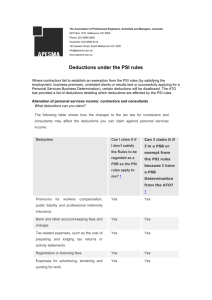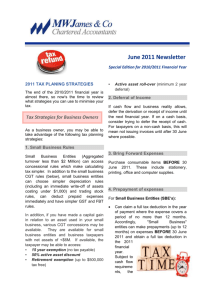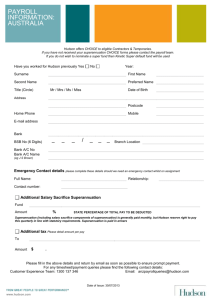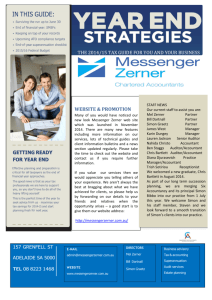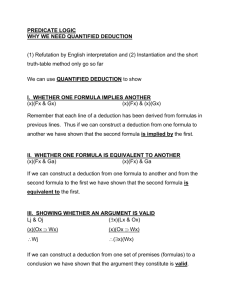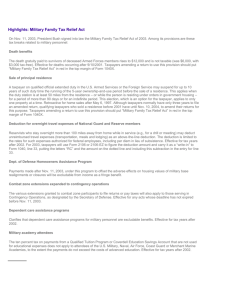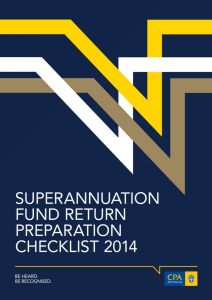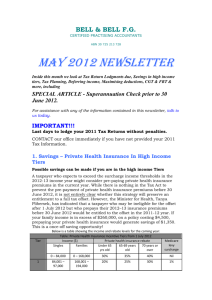Client Alert
advertisement
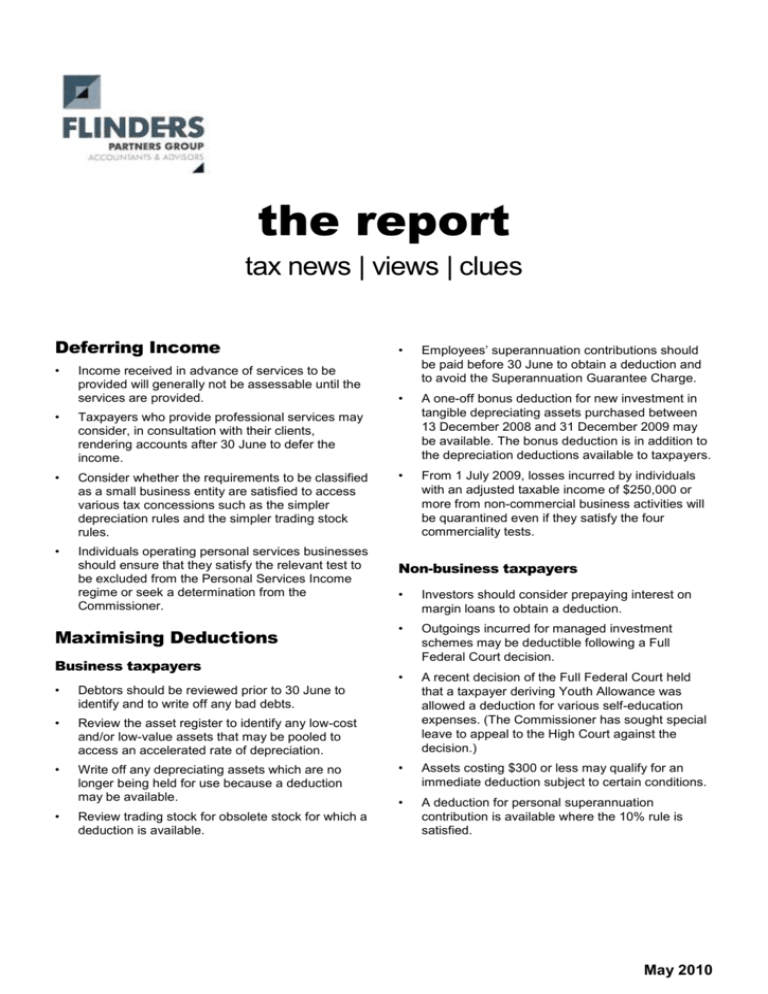
the report tax news | views | clues Deferring Income • Income received in advance of services to be provided will generally not be assessable until the services are provided. • Taxpayers who provide professional services may consider, in consultation with their clients, rendering accounts after 30 June to defer the income. • Consider whether the requirements to be classified as a small business entity are satisfied to access various tax concessions such as the simpler depreciation rules and the simpler trading stock rules. • Individuals operating personal services businesses should ensure that they satisfy the relevant test to be excluded from the Personal Services Income regime or seek a determination from the Commissioner. Maximising Deductions Business taxpayers • Debtors should be reviewed prior to 30 June to identify and to write off any bad debts. • Review the asset register to identify any low-cost and/or low-value assets that may be pooled to access an accelerated rate of depreciation. • Write off any depreciating assets which are no longer being held for use because a deduction may be available. • Review trading stock for obsolete stock for which a deduction is available. • Employees’ superannuation contributions should be paid before 30 June to obtain a deduction and to avoid the Superannuation Guarantee Charge. • A one-off bonus deduction for new investment in tangible depreciating assets purchased between 13 December 2008 and 31 December 2009 may be available. The bonus deduction is in addition to the depreciation deductions available to taxpayers. • From 1 July 2009, losses incurred by individuals with an adjusted taxable income of $250,000 or more from non-commercial business activities will be quarantined even if they satisfy the four commerciality tests. Non-business taxpayers • Investors should consider prepaying interest on margin loans to obtain a deduction. • Outgoings incurred for managed investment schemes may be deductible following a Full Federal Court decision. • A recent decision of the Full Federal Court held that a taxpayer deriving Youth Allowance was allowed a deduction for various self-education expenses. (The Commissioner has sought special leave to appeal to the High Court against the decision.) • Assets costing $300 or less may qualify for an immediate deduction subject to certain conditions. • A deduction for personal superannuation contribution is available where the 10% rule is satisfied. May 2010 Capital Gains Tax • • • • Consider deferring the disposal of shortly-held assets to access the CGT discount, where available. Individual taxpayers can consider contributing some or all of capital gain to their superannuation fund because a deduction may be available for personal superannuation contributions. • The Court also affirmed that the trustee can distribute capital gains as income of the trust for tax purposes if the trust deed permits it. • Avoid retaining income in a trust because the income may be taxed at 46.5%. Superannuation • Consider whether a rollover relief is available to defer any capital gains. A re-contribution strategy may produce tax benefits for taxpayers under age 60. • Consider the availability of the small business CGT concessions which can disregard, reduce or defer a capital gain arising from the disposal of an asset which has been used by an entity in the course of carrying on its business. Low-income earners (including self-employed persons) should consider making a personal superannuation contribution to qualify for the government superannuation co-contribution payment. • The concessional contributions cap for the 2009/10 has been reduced to $25,000 or $50,000 if over 50 years of age. • For the 2009/10 income year, pensioners have the option to draw half of the year’s minimum required pension amount. • From 1 July 2009, a person’s ‘reportable superannuation contributions’ is included in their ‘adjusted income’ when determining their eligibility for various tax offsets and social security benefits, such as the, the pensioner tax offset, senior Australians tax offset, and the spouse superannuation tax offset. • From the 2009/10 income year, a spouse also includes a same sex partner where they live together on a genuine domestic basis in a relationship as a couple, or a partner (whether of the opposite or same sex) where the relationship is registered under a State or Territory law. Companies • The franking percentage for distributions to shareholders should be the same for each franking period to avoid a franking deficit tax. • A private company has four months after the end of the income year to provide its shareholders with a distribution statement for dividends paid. • Loans, payments and debt forgiveness by private companies to their shareholders and associates should be repaid by the earlier of the due date for lodgment of the company’s return for the year or the actual lodgment date. Alternatively, appropriate loan agreements should be in place. Trusts • • • A minor (ie aged under 18) can receive up to $3,000 in non-taxable distribution for the 2009/10 income year. If a company is owned by a discretionary trust, consider whether a family trust election (FTE) is needed to ensure any losses or bad debts incurred by the company will be deductible. If shares are owned by a discretionary trust, consider the necessity for the trustee to make a FTE to ensure any franking credits attached to the dividends will not be ‘wasted’. • If a FTE has been previously made, avoid distributing outside the family group to avoid the family trust distributions tax. • A recent High Court case confirmed that it is correct to apply the proportionate approach if the net income of a trust for tax purposes exceeds its accounting income. Developments Since 1 July 2009 Taxpayers should note recent tax law changes, which include: • the foreign employment income derived by Australian resident individuals is not exempted from income tax, except in specified circumstances; • the availability of an optional CGT roll-over for the transfer of assets between ‘fixed trusts’ and thus deferring the making of any capital gain or loss in respect of the transfer; and • the changes to the tax treatment of employee share schemes (ESS), eg the $1,000 discount for upfront taxation of an ESS interest is only available if an individual’s adjusted income is less than $180,000. Important: This is not advice. Clients should not act solely on the basis of the material contained in this Bulletin. Items herein are general comments only and do not constitute or convey advice per se. Also changes in legislation may occur quickly. We therefore recommend that our formal advice be sought before acting in any of the areas. The Bulletin is issued as a helpful guide to clients and for their private information. Therefore it should be regarded as confidential and not be made available to any person without our prior approval.
